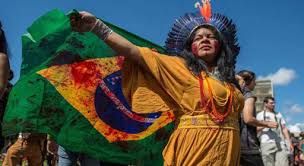By Samuel Ogunsona reporting from Dubai
The Brazilian first ever minister for Indigenous peoples, Sônia Guajajara, has said the next Climate Summit will see the presence of more indigenous peoples.
The next Climate Summit tagged COP30 will be hosted in Brazil in 2025.
Gujajare spoke
during a strategic meeting titled “BUILDING THE INTERNATIONAL
INDIGENOUS COMMISSION FOR COP30” at the ongoing climate action summit in Dubai.
Since the inception of Brazilian President Luiz Inácio Lula da Silva, the country has shown much commitment to the indigenous peoples.
It became the first President to appoint a Minister to oversee the affairs of indigenous people.
In April, 2023, President Lula also signed decrees to recognize six new indigenous territories, which indigenous peoples were authorised to occupy the land and granted exclusive access to its forest and generic resources in addition to the authority to expel invaders.
Sonia in her statement said Brazil has the highest number of indigenous people represented at the ongoing COP28 climate action summit and are ready to strategize on expanding the numbers of indigenous people that will be represented in Brazil all over the globe come 2025.
She said, “it is important for us to begin talking about this, that way we are ahead of us till COP30. We have been talking about the showing of indigenous participation. We have assumed spaces that have been built as a result of the series of indigenous participation in the COP since 2009 till date. It is important for us to currently think about indigenous people participation.”
She said the host of COP30 that will take place in 2025 in Brazil.
Sonia said “The idea tonight is that we can think together about what is the dialogue space we are going to create to think about our participation in COP30. We can observe already that there has been a great increase of indigenous persons at the climate conferences and up to what point does this presence mean, participation in effectiveness, in incidence, how are we participating in the COP spaces”
“So well you have it. We have the largest delegations, the greatest delegations of the indigenous people of Brazil and the largest delegation of peoples all over the world”she said.
She added further, “It is the largest delegation in the history of the COP.We are over three hundred persons participating in the COP tonight in this event.
But what is the real impact of indigenous persons here?”
Sonia said “This moment is for us to reflect within ourselves what we are doing to organize ourselves and our countries to be able to come here with proposals, documents and are able to have an effect on the decisions made by our own countries”
“We have come here and we have been happy to just be in the side event and be in those meetings talking just among ourselves, talking to each other. But look at how much structure we have reached to participate in today”
She said there is an is an indigenous caucus but that caucus does not have one president, but many co-chairs that are distributed regionally.
Sonia said “In our case, Brazil, we participate in the representation. We are here representing the Latin America, the Caribbean and this is how we were organizing the caucus”
“We are working currently working to increase Brazil’s participation in the next mandate, the next term of the cheering by the leaders in Latin America and Caribbean” she said
“So we have the space in participation of the caucus which is where the Indigenous people meet everyday to be able to debate our strategies, define our position. This is a very important space for all indigenous persons participating in the COP”
She said it is important to go to the daily meetings being a very important space, where national strategies are created adding that not everyone here comes to participate in this caucus meetings
“They come when the agendas are already established, to find out what’s being scheduled and who is invited” she noted.
Chadian activist, Hindou Oumarou Ibrahim, who was also one of the panelists at the side event explained that delegates should also talk about the participation of indigenous people at COP29 which is the walk way to COP30 in Brazil.
She emphasized on the courage of Brazilian President for appointing his first ever Minister of indigenous people as an example for other nations to follow.
“The COP30 is going to be in Brazil and everyone is excited about it but there are steps to follow. The first step is COP29, we have to pass through COP29 before COP30 and we must surely talk about our participation in decision making at the next COP” Hindou said.
The Chadian said “We need to work on both sides which is how we can build or strengthen the participation of indigenous people at COP29”
“We have to work through the seven socio-cultural regions as Sonia has said earlier. We have set up the procedures in which each COP which to be hosted by a region must have a co-chair but for Latin America, we already set it because we have many Spanish speakers”
He said reason is because the negotiations are only in English and delegates need who to translate.
“COP29 is going to be in Europe and we would have Asia and European co-chair in addition to be permanent in Latin America, at the end of the COP29 we will be deciding to nominate a co-chair from Latin America.
She said it is important to respect the procedures and the seven socio-cultural regions.

